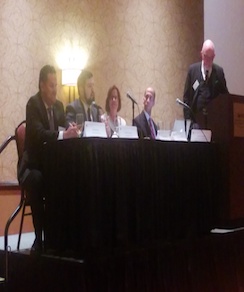One of the many highlights of OCCRL’s 2015 Scaling Up Pathways to Results conference was the afternoon plenary titled Using High-Impact Practices to Strengthen Student Transitions and Success. Moderated by Dr. James Applegate, Executive Director of the Illinois Board of Higher Education, this panel featured speakers from across the educational pathway: Luis Narvaez and Dakota Pawlicki, both from Chicago Public Schools; Judith Marwick from William Rainey Harper College, and Jermaine Williams from Northeastern Illinois University. Panelists shared their own promising practices and strategies for assessment, as well as the critical cross-sector partnerships that have produced meaningful results for underserved students experiencing a broad range of transitions, whether from secondary to community college, community college to university, or secondary to university.
Practices included NEIU’s award-winning summer bridge program and long-standing supports for Latino and African American/First-generation students; Harper’s outstanding alignment efforts resulting in double-digit percentage increases in dual enrollment and decreases in incoming students’ need for developmental education; and Chicago Public Schools’ partnership building through the Chicago Higher Education Compact and their Latino College Access Committee.
While Dr. Applegate reflected on the strengths of these evidence-based initiatives, he also observed what many of us have come to realize—“there’s not a problem in higher education that hasn’t been solved somewhere…” So, how do we bring these solutions to scale for all students? Panelists responded by discussing their efforts to leverage existing supports and repurpose resources to scale evidence-based work, rather than adding on small or pilot programs. In other words, scaling is not a matter of adding to an existing structure, but transforming it on a strong foundation of evidence. Panelists further emphasized the critical role of partnerships to combine and share evidence (data), transform student transitions, and to unite similar programs that work to reach more students. Dr. Applegate summarized this conversation by reminding us that “many points of light” cannot illuminate a dark path, but united, these points “become a beam on the pathway.”
If we’re going to scale meaningful innovations to change outcomes for our students, then strategic use of evidence, building partnerships or trust-based networks, and more will be critical to institutional transformation. To learn more about transforming “points of light” into a single “beam,” consider reviewing OCCRL’s Guiding Principles for Scaling Transformative Change, which reflect and dig more deeply into these concepts.
Heather McCambly is the Project Coordinator for the Pathways to Results Initiative at the Office of Community College Research and Leadership (OCCRL). Prior to moving to Illinois, Heather was a Program Associate in the Office of Diversity, Equity, and Student Success at the Association of American Colleges and Universities.




